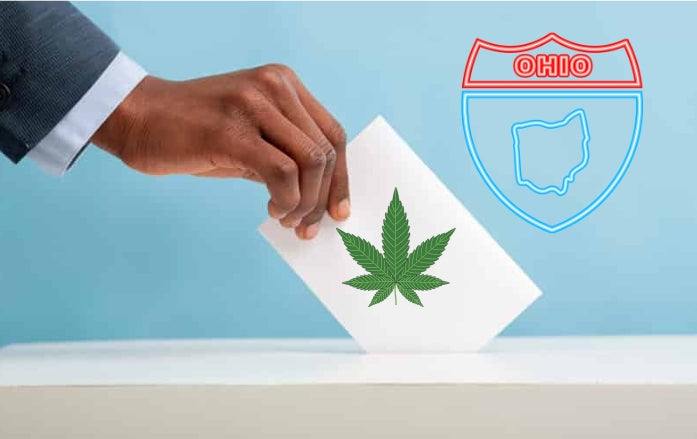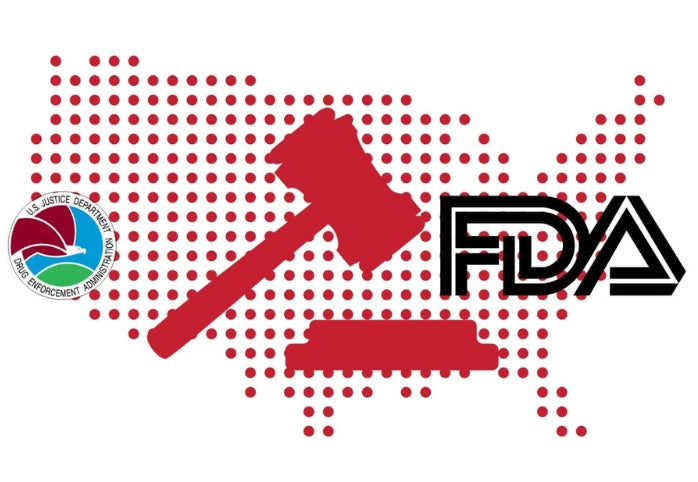In the past two weeks, law enforcement officials in the state have begun a rigorous shakedown on businesses selling items containing illegal amounts of hemp-based THC.

2023 is shaping up to be the "year of hemp," but for all the wrong reasons. With the proliferation of hemp-derived low-THC products spreading like wildfire across the United States, more and more states are beginning to police the sale of these items aggressively. According to numerous local and national media outlets, Nebraska authorities recently raided five stores that failed compliance checks earlier this year, seizing products, paraphernalia and financial records from all locations.
The five dispensaries are The Cannabis Factory, Kind Life Dispensary, and three 50 Shades of Green locations. Each store sells a wide variety of hemp-based THC products, including the notorious and much-maligned delta-8 THC cannabinoid derivative. The passage of the 2018 Farm Bill made hemp and its growing array of byproducts federally legal to cultivate, manufacture and sell.
However, an unintended yet troublesome loophole emerged from the rescheduling of hemp. According to the language of the Farm Bill, any part of the cannabis sativa plant containing less than 0.3% delta-9 THC (the intoxicating cannabinoid most associated with the feeling of getting "high") is classified as hemp and is now legal. Any portion containing more than that threshold amount is considered cannabis and still prohibited for cultivation, possession, and sale under the Controlled Substances Act.
The law did not anticipate the ambitious number of innovative hemp entrepreneurs who quickly entered the new market. They immediately began searching for creative ways to leverage hemp's new legal status. One particularly effective and lucrative loophole many of those aspiring hemp businesses began to exploit centered on creating and selling synthetically-derived delta-8 THC.
Delta-8 occurs naturally in minimal amounts in hemp and has much milder intoxicating effects than delta-9. However, a synthetic process involving hemp-derived CBD can create a much more potent and potentially dangerous form of delta-8.
Because the chemically manufactured delta-8 technically derives from the hemp plant, multiple courts have ruled that it is still legal to manufacture and sell under the provisions outlined in the Farm Bill. As a result, several enterprising hemp industry entrepreneurs began manufacturing and marketing products containing the more potent form of the isomer.
Following those decisions, mostly unregulated items with hemp-based delta-8 began appearing in convenience stores and gas stations nationwide. Tragically, at least one of those products was linked to the death of a toddler in Virginia last year. In addition, there have been multiple cases of individuals, including teenagers, falling ill after ingesting items containing delta-8.
In response to the proliferation of synthetically manufactured THC products, several states began to pass legislation severely restricting and, in many cases, banning the politically toxic THC variant. The raid by Nebraska authorities is just the latest example of a state stepping in to address the growing problem of primarily unregulated hemp-derived low-THC products inundating a marketplace that largely targets kids with items resembling popular candy brands like gummies.
According to Erika Thomas, a spokeswoman for the Lincoln Police Department, investigators performed spot checks on ten local dispensaries this past January, February and March. As a result of those checks, officials discovered that five of the ten businesses were selling non-compliant THC products.
Then, this past June, Lincoln-Lancaster County Narcotics detectives performed follow-up spot checks at those exact 10 locations, and their search uncovered the same results. Police served search warrants on the five stores on August 7, where officials seized plant materials, edibles, drug paraphernalia, and financial records as part of the department's probe into the dispensaries.
Thomas quickly pointed out that the LPD's raid of the local businesses came in response to concerns by local Lincoln residents regarding advertisements that suggested the stores were selling illegal-grade THC products.
One of the law enforcement officials spearheading the investigation is Sarpy County Sherriff Jeffrey Davis. In a news release concerning the raids, Davis said, "Most products tested were above 5% THC, and some items tested 15% THC. The number one issue that all of us agree on is consumer protection." During his comments, Davis noted the legal limit in Nebraska is 0.5%.
"Most products tested were above 5% THC, and some items tested 15% THC. The number one issue that all of us agree on is consumer protection."
- Sarpy County Sherriff Jeffrey Davis
It is unclear at this time if store owners or staff caught up in the raids and investigation will face any legal consequences for their actions. So far, no one has been charged, and law enforcement officials have already said it will be up to the Attorney General's Office moving forward.
Nebraska does not currently have any form of legalized cannabis, medicinal or recreational. Nebraskans for Medical Marijuana is making a third attempt to place the issue on the November 2024 ballot for voters to decide. They must collect 87,000 verified signatures by July 2024 for that ballot initiative to occur.
In the meantime, state officials have vowed to continue their efforts to curb the spread and influence of illegal hemp-derived THC products. Furthermore, many industry advocates and stakeholders are also keeping a close on Washington as lawmakers continue debating the 2023 iteration of the Farm Bill, which could effectively close the delta-8 loophole, among other issues currently hurting the still young and developing market sector.
The next two years could prove to be crucial to hemp's future survival. Hopefully, Congress and state officials can work together to identify and eliminate all "gotchas" lingering from 2018. If not, more actions against hemp businesses nationwide will occur as regulators try to keep up with the law and its loopholes.




























